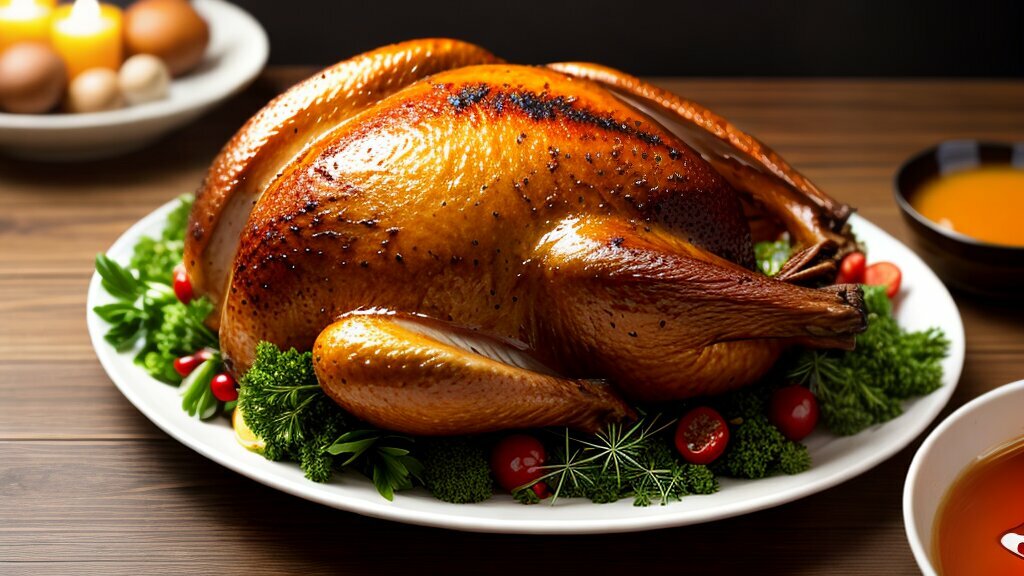
Thanksgiving is just around the corner, and for many of us, that means it’s time to break out the turkey fryer. But before you can get started on your crispy, juicy bird, you need to choose the right oil for your fryer.
The type of oil you use plays a crucial role in achieving that perfect golden crust and moist center. But with so many options available, it can be tough to know where to start. In this article, I’ll guide you through the different types of oil available for your turkey fryer and provide recommendations for achieving a delicious result.
Key Takeaways
- Choosing the right oil is crucial for achieving a perfectly fried turkey.
- The most common oils for turkey fryers are canola oil, peanut oil, and vegetable oil.
Types of Oil for Turkey Fryer: Exploring Your Options
When it comes to choosing the best type of oil for your turkey fryer, there are a few options to consider. Each has its own unique characteristics that can impact the final result of your fried bird. Here, I will explore the most common types of oil used for turkey fryers and provide insights into their benefits and drawbacks.
Canola Oil for Turkey Fryer: A Versatile Choice
Canola oil is a popular choice for frying turkey due to its high smoke point, which means it can handle the high temperatures required for deep frying. It also has a neutral flavor, which won’t overpower the taste of the turkey. Canola oil is also a healthier option compared to some other oils, as it is low in saturated fats and high in monounsaturated and polyunsaturated fats.
When using canola oil in your turkey fryer, it’s important to avoid overfilling the pot and using a thermometer to ensure the oil stays at the proper temperature. It’s also recommended to use fresh oil for each fry to prevent any off flavors or potential health concerns.
Peanut Oil for Turkey Fryer: Adding Flavor and Crispiness
Peanut oil is another popular choice for frying turkey, as it has a high smoke point and can add a rich flavor to the bird. It also imparts a delicious crispiness to the skin of the turkey. However, one potential drawback is that peanut oil is a common allergen, so it may not be the best choice if you or any of your guests have an allergy.
When using peanut oil in your turkey fryer, it’s important to monitor the temperature closely, as it has a lower smoke point compared to some other oils. It’s also recommended to avoid reusing the oil to prevent any potential contamination.
Vegetable Oil for Turkey Fryer: A Budget-Friendly Option
Vegetable oil is a budget-friendly option for frying a turkey, as it is widely available and affordable. It also has a neutral flavor, so it won’t impact the taste of the turkey. However, it has a lower smoke point compared to some other oils, which means it may not be the best option for high-temperature frying.
When using vegetable oil in your turkey fryer, it’s important to monitor the temperature carefully and avoid overcrowding the pot. It’s also recommended to use fresh oil for each fry to prevent any off flavors or potential health concerns.
Canola Oil for Turkey Fryer: A Versatile Choice
If you’re looking for a safe and healthy option for frying your turkey, canola oil is an excellent choice. This oil has a high smoke point, which means it can withstand the high temperatures required for deep frying without burning or smoking excessively. It also has a neutral flavor that won’t overpower the natural taste of your bird.
One of the best things about canola oil is that it is low in saturated fat and high in unsaturated fats, which are considered “good” fats for heart health. This makes it a healthier option than many other oils commonly used for deep frying.
When using canola oil for your turkey fryer, it’s important to follow some basic guidelines. First, make sure you are using fresh oil that has not been used for any other cooking purposes. This will help prevent the oil from breaking down and producing harmful compounds during frying.
You should also monitor the oil temperature carefully to ensure it stays within the recommended range for deep frying. This will help ensure that your turkey cooks evenly and doesn’t become overcooked or undercooked.
If you’re looking for a versatile and healthy oil for your turkey fryer, canola oil is definitely worth considering.
Peanut Oil for Turkey Fryer: Adding Flavor and Crispiness
When it comes to deep frying a turkey, peanut oil is a popular choice due to its high smoke point and ability to add exceptional flavor and crispiness to the bird.
With a smoke point of approximately 450°F, peanut oil can withstand the high temperatures required for frying a turkey, resulting in a deliciously crispy exterior and moist interior. Additionally, peanut oil has a natural nutty flavor that can enhance the taste of the meat and make it more flavorful.
It is important to note that peanut oil is not recommended for individuals with peanut allergies. If this is a concern, other options such as canola oil or vegetable oil may be a safer choice.
When using peanut oil in a turkey fryer, it is crucial to follow proper safety precautions. Only use fresh oil, do not overfill the fryer, and never leave the fryer unattended. It is also essential to carefully thaw and dry the turkey before frying to prevent any oil splatters or accidents.
In conclusion, if you are looking to add rich flavor and a crispy texture to your fried turkey, peanut oil is an excellent choice. However, it is important to keep safety in mind and consider the needs of any individuals with peanut allergies before using this oil in your fryer.
Vegetable Oil for Turkey Fryer: A Budget-Friendly Option
If you’re looking for an affordable option for frying your Thanksgiving turkey, vegetable oil is a great choice. It’s easy to find in most grocery stores and has a neutral flavor that won’t overpower your bird.
While vegetable oil has a lower smoke point than peanut or canola oil, it can still be used successfully for frying a turkey. Just be sure to keep a close eye on the temperature and don’t let it exceed the smoke point.
If you’re concerned about the health considerations of using vegetable oil, consider using a blend of vegetable and canola oil. This will give you the benefits of a higher smoke point while still keeping costs down.
Overall, vegetable oil is a reliable and budget-friendly option for frying a turkey. Just be sure to use fresh oil and follow all safety precautions for deep frying.
Tips for Choosing the Safest Oil for Turkey Fryer
When it comes to deep-frying a turkey, selecting the right oil is crucial for both flavor and safety. Here are some tips to keep in mind when selecting the safest oil for your turkey fryer:
- Look for a high smoke point. The smoke point is the temperature at which the oil starts to smoke and break down. Choose an oil with a high smoke point to avoid burning or overcooking your turkey. Canola and peanut oil both have high smoke points and are ideal for frying a turkey.
- Consider allergy concerns. If you or your guests have nut allergies, avoid using peanut oil. Instead, opt for a vegetable or canola oil. Be sure to check the ingredients list before selecting an oil to make sure it is safe for everyone to consume.
- Use fresh oil. Deep frying a turkey requires a significant amount of oil, but don’t be tempted to reuse oil from previous fryings. Reusing oil can lead to a higher risk of food contamination and a greasy, unappetizing taste. Always use fresh oil for frying a turkey.
- Take safety precautions. Deep frying a turkey can be dangerous if not done correctly. Always use a fryer with a built-in thermometer to monitor the temperature of the oil. Never fry a turkey indoors or on a flammable surface. And be sure to wear appropriate protective gear such as gloves and goggles to avoid burns and splatters.
By following these tips, you can choose the safest oil for your turkey fryer and ensure a delicious and safe Thanksgiving feast for all to enjoy.
Conclusion
Choosing the right oil for your turkey fryer is crucial to achieving the perfect Thanksgiving feast. Whether you opt for the versatile canola oil, flavorful peanut oil, or budget-friendly vegetable oil, there are various options to suit your preferences and needs.
Remember to take into account factors such as smoke point, flavor, and health considerations when selecting your oil. Always use fresh oil, and follow important safety precautions to avoid accidents.
Happy Frying!
In conclusion, I hope this article has provided you with valuable insights into the different types of oil available for your turkey fryer. Don’t be afraid to experiment with oils and techniques to find your preferred method for a juicy and crispy bird.
With proper preparation and attention, you can wow your guests with a delicious and perfectly fried turkey this Thanksgiving. From my kitchen to yours, happy frying!
FAQ
Q: What is the best type of oil for a turkey fryer?
A: The best type of oil for a turkey fryer depends on personal preference and desired flavors. The most common options are canola oil, peanut oil, and vegetable oil.
Q: What are the characteristics of canola oil for a turkey fryer?
A: Canola oil is a versatile choice with a high smoke point and neutral flavor. It is considered one of the safest options for frying a turkey.
Q: How does peanut oil enhance the flavor and crispiness of a fried turkey?
A: Peanut oil has a high smoke point and adds a rich flavor to the turkey. It also helps achieve a crispy skin for a delicious result.
Q: Is vegetable oil a budget-friendly option for a turkey fryer?
A: Yes, vegetable oil is a cost-effective choice for frying a turkey. It is widely available and has a neutral flavor that allows the natural flavors of the turkey to shine.
Q: What should I consider when choosing the safest oil for a turkey fryer?
A: When selecting an oil for your turkey fryer, consider factors such as smoke point, allergy considerations, and the importance of using fresh oil. It’s essential to follow safety precautions while deep frying a turkey.
- Make These 10 Delicious Appetizers in Your Air Fryer - September 22, 2023
- How to Cook Lamb Shoulder Chops in Air Fryer? - September 13, 2023
- How to Cook Crinkle Fries in Air Fryer? - September 13, 2023

